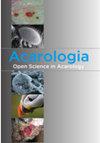A method for semi-field rearing of Varroa destructor (Acari: Varroidae) to obtain mites of controlled age and specific life cycle
IF 0.9
3区 农林科学
Q3 ENTOMOLOGY
引用次数: 1
Abstract
Varroa destructor is one of the most devastating ectoparasites of the honey bee, Apis mellifera, worldwide. Given that V. destructor has very low survivability and exhibits no successful reproduction away from their natural environment and host and that the availability of mites for experimental purposes is limited by seasonality, several protocols of mite rearing under laboratory conditions have been developed. However, only one of these rearing systems has been able to yield a fertile second generation with a low mite survival. The aim of this study was to develop a semi-field rearing method to obtain mites of known age and life cycle that can be maintained through several generations. We registered and compared survival and reproductive parameters of mites of controlled age during four generations (P, F1, F2, F3) and evidenced no significant differences between these mite groups for these life-history traits. With present results we demonstrate that it is possible to successfully produce a third generation of mites under semi-field conditions. This study brings useful information about key conditions for the proper reproduction of mites in a controlled rearing system and provides a potential standardized method for V. destructor research, especially for host-parasite interaction experiments.一种半田间饲养瓦螨(Acari:Varroidae)以获得控制年龄和特定生命周期的螨的方法
瓦罗阿破坏者是世界范围内蜜蜂最具破坏性的体外寄生虫之一。鉴于灭螨器的生存能力非常低,在远离自然环境和宿主的地方无法成功繁殖,而且用于实验目的的螨虫的可用性受到季节性的限制,已经制定了几种在实验室条件下饲养螨虫的方案。然而,这些饲养系统中只有一种能够以较低的螨存活率产生可生育的第二代。本研究的目的是开发一种半田间饲养方法,以获得已知年龄和生命周期的螨虫,这些螨虫可以维持几代。我们记录并比较了四代(P、F1、F2、F3)控制年龄螨的生存和繁殖参数,并证明这些生活史特征在这些螨组之间没有显著差异。根据目前的结果,我们证明在半田间条件下成功生产第三代螨是可能的。这项研究为在受控饲养系统中正确繁殖螨虫的关键条件提供了有用的信息,并为灭活病毒的研究,特别是宿主-寄生虫相互作用实验提供了一种潜在的标准化方法。
本文章由计算机程序翻译,如有差异,请以英文原文为准。
求助全文
约1分钟内获得全文
求助全文
来源期刊

Acarologia
ENTOMOLOGY-
CiteScore
2.00
自引率
18.20%
发文量
81
期刊介绍:
Acarologia is a free open-access journal. Please help us by submitting manuscripts in accordance with following instructions.
All manuscripts which do not conform to the instructions will be returned to authors without the benefit of review.
Acarologia publishes the results of original research on all aspects of Acarology.
The journal policy is that taxonomic descriptions should include several species within a same genus/family, when possible.
The editors reserve the right to refuse manuscripts when authors intentionally divide individual species descriptions of the same genus/family into distinct publications.
Single species descriptions should be clearly justified based on their scientific interest.
 求助内容:
求助内容: 应助结果提醒方式:
应助结果提醒方式:


